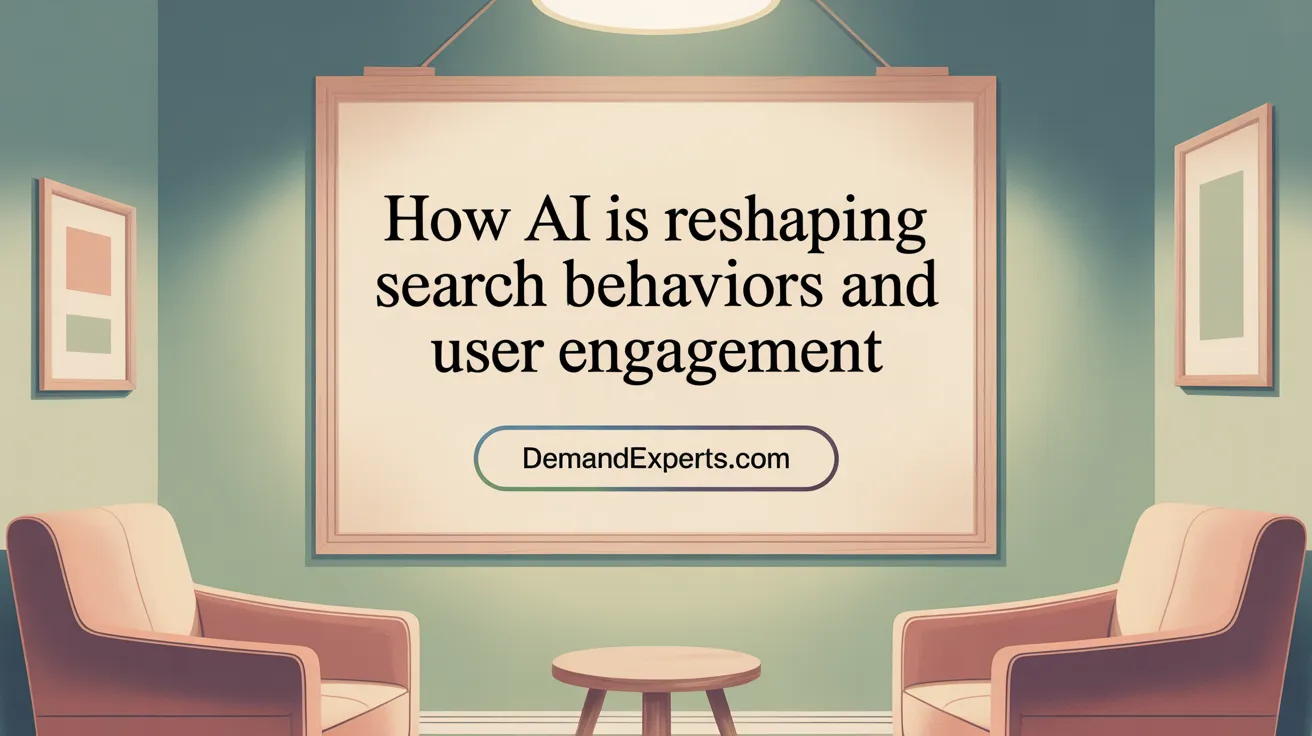Understanding the Transformative Role of AI in Search
Artificial intelligence is fundamentally redefining how users access and interact with information online. With innovations like Google’s AI Overviews and AI Mode, the search landscape is evolving from traditional keyword-based results to intelligent, conversational, and deeply personalized experiences. This article explores the future trajectory of search technology driven by AI, the impact on user behavior, SEO, marketing strategies, and the broader implications for information retrieval and digital discovery.
AI Overviews: A New Era in Search Summarization

What are AI Overviews in Google Search and how do they work?
AI Overviews are innovative summaries generated by Google’s advanced AI system, designed to present users with quick, reliable snapshots of complex topics or questions. Powered by the Gemini large language model, these overviews synthesize information from multiple reputable sources, delivering a concise, yet comprehensive answer at the top of search results, often occupying the coveted usually called "position zero." These summaries incorporate multi-step reasoning, capturing nuances and providing source citations, which boost trustworthiness.
The AI Overviews facilitate a more interactive and efficient search experience by organizing relevant insights and offering links for users who wish to delve deeper. They are particularly useful for answering complex queries that demand multi-faceted understanding, like comparisons, definitions, and detailed explanations. Users can also personalize the presentation of AI Overviews by opting for simplified or more detailed responses, making information accessible for both beginners and advanced users.
How has Google expanded its AI Overviews feature in search?
Google’s push to extend the reach of AI Overviews has been rapid and strategic. Initially launched in the United States, the feature now spans over 200 countries and territories, covering more than 40 languages, including Arabic, Chinese, Malay, and Urdu. This expansion broadens access to instant, AI-crafted summaries, enabling users worldwide to quickly find answers without sifting through multiple websites.
The AI Overviews now harness more powerful models, such as Gemini 2.5 and Gemini 2.0, which improve processing speed and response accuracy, especially for complex questions involving coding, math, or multimodal data (images, voice, videos). Additionally, new features like AI Mode within Search Labs enrich the search experience with multimodal reasoning, real-time data integration, and more interactive capabilities.
This growth in scope has led to over 1.5 billion users engaging with AI Overviews globally. Continuous innovations include integrating AI-generated shopping assistance, expanding into voice and visual search, and testing future functionalities aimed at personalization and deeper web exploration. All these efforts suggest that AI Overviews are becoming a cornerstone of Google’s vision for a more intelligent, user-friendly search environment.
Cutting-Edge AI Models Driving the Future of Search
What advances in AI models, such as agentic models and deep research, are influencing search technology?
Recent developments in AI models are revolutionizing how search engines operate and deliver information. Large language models (LLMs) like Gemini 2.5 have become central to these innovations. Gemini 2.5 is Google’s most intelligent model yet, capable of understanding complex, multimodal queries that include text, images, audio, and video. This multimodal reasoning enables more precise and context-aware responses.
One significant leap is the integration of agentic AI capabilities, which allow models to perform tasks proactively. These models can plan, execute, and automate activities like purchasing tickets or comparing product options across multiple sites. Projects like Mariner exemplify this, enabling AI to autonomously manage tasks that traditionally require human input.
Deep research models are also emerging, equipped to issue hundreds of searches in the background and compile comprehensive, fully-cited reports within minutes. This facilitates extensive research and expert-level insights, supporting fields like finance, sports analytics, and scientific discovery.
Platforms are adopting retrieval-augmented generation (RAG) techniques. These enable AI to fetch relevant information from vast sources, rapidly synthesize answers, and cite authoritative sources accurately. Coupled with semantic indexing, these advancements ensure search results are not only relevant but also timely and reliable.
Projects such as Astra and Search Live contribute visual and real-time interaction capabilities, transforming static search into an immersive experience. Astra’s integration of live visuals from video and images allows users to interact in real time, while Search Live extends Google Lens into real-time scenes and conversation.
Overall, these AI advancements drive a shift from traditional keyword matching to conversational, reasoning-based search systems. The new models understand the user's intent more deeply, provide expert-level answers, and automate complex tasks, making search faster, smarter, and more intuitive.
| AI Model/Technology | Main Functionality | Impact on Search | Example Platforms/Projects |
|---|---|---|---|
| Gemini 2.5 | Multimodal understanding, reasoning | Enhanced context-aware responses, complex query handling | Google Search, AI Overviews |
| Agentic AI | Task automation, planning | Streamlined user tasks, autonomous actions | Project Mariner, shopping assistants |
| Deep Search | Extensive multi-source research | Fast expert reports, deep insights | Google AI Mode |
| RAG & Semantic Indexing | Data retrieval and synthesis | Timely, relevant answers | Google’s Astra, Search Live |
| Visual & Real-Time Interaction | Live visual updates, scene understanding | Immersive search experiences | Astra, Search Labs |
The continual evolution of these models signals a shift toward highly personalized, intelligent search experiences that anticipate and fulfill user needs with minimal effort. As these AI capabilities mature, search engines are expected to become more proactive, autonomous, and contextually aware, shaping the future of digital information access.
AI Innovations Transforming User Behavior and Search Habits

How is artificial intelligence transforming user behavior and information-seeking habits?
AI is changing the way people search for and consume information by making access faster and more tailored. Features like AI-powered summaries, personalized suggestions, and conversational interfaces help users find what they need in less time.
Generative AI tools such as ChatGPT and Google's Gemini enable users to ask complex questions, get quick facts, and have synthesized results—sometimes replacing the need to visit multiple websites.
This shift encourages users to become more familiar with AI tools and rely on them for quick insights and decision-making. Many now expect instant, context-rich answers, which alters traditional search behaviors that depended on browsing through links.
While many users still use conventional search methods, the trend toward AI-based search is growing, especially as these tools improve in understanding multimodal inputs like images, videos, and audio. As AI continues to evolve with explainability and personalization, it promises to deepen its impact on our habits of seeking, interpreting, and utilizing information across different fields, including healthcare and research.
What has research indicated about user behavior when AI Overviews appear in Google Search results?
Studies show that AI Overviews in Google search results significantly influence how users behave online. About 60% of searches conclude after viewing a concise AI summary, with many users often satisfied enough to skip further browsing.
These AI summaries serve as quick, authoritative sources that often replace traditional visits to multiple content pages. Consequently, users are increasingly relying on AI-generated responses for their inquiries, with about 80% leveraging large language models like GPT or Gemini for research tasks.
Despite these changes, many still stick to historical habits, occasionally clicking on traditional links when detailed information is needed. Nonetheless, the trend is clear: AI Overviews and summaries are reshaping typical search sessions by delivering relevant information rapidly and reducing the need for extensive browsing. This evolution suggests a future where quick, AI-curated answers become a dominant mode of information access.
Emerging Paradigms and Trends in AI-Driven Search

What are the emerging paradigms and technological trends in AI-driven search?
The landscape of search is undergoing a significant transformation driven by advancements in artificial intelligence. One of the most prominent shifts is the move from traditional keyword-based search to more conversational and context-aware interactions. Modern AI models like Google's Gemini utilize large language processing capabilities to understand complex, nuanced questions, enabling users to ask detailed inquiries and receive precise, synthesized answers.
Multimodality is also gaining importance, allowing AI systems to process and integrate multiple kinds of data such as images, videos, and audio. This multimodal approach enhances understanding and discovery; for example, users can now ask about objects in videos or images, making search more immersive and intuitive.
AI-powered recommendation systems and predictive analytics are being integrated into search engines, personalizing results based on past behavior, preferences, and expected future needs. This level of personalization transforms the user experience into a proactive, anticipatory process—often referred to as predictive search.
Generative AI plays a critical role in content creation and SEO evolution. AI models like ChatGPT and Gemini are capable of producing high-quality, human-like content that can be used for detailed summaries, reports, or even creative media, optimizing content for search relevance and user engagement.
This technological trajectory pushes search beyond static lists of links to dynamic, intelligent systems that understand the user context, generate relevant content, and assist in decision-making. Features like AI Overviews, which offer quick summaries synthesized from multiple sources, and AI-driven visual understanding are redefining how information is accessed and consumed.
Overall, AI-driven search is embracing a future of highly personalized, multimodal, and conversational interactions that rely on deep learning, multimodal models, and agentic systems capable of complex reasoning. This evolution indicates a move towards immersive, intuitive, and anticipatory search experiences that cater to individual needs with unprecedented precision.
AI-Enabled Features Redefining Search Interfaces
What are some future developments in search technology driven by artificial intelligence?
The future of search technology will be highly influenced by advancements in artificial intelligence, particularly with the integration of powerful generative models like Gemini 2.5. These models will enable search engines to understand and process complex, multimodal queries that include text, images, audio, and video, making interactions more intuitive and seamless.
One significant development will be the rise of advanced agentic AI systems, inspired by projects such as Google’s Project Mariner and Deep Search. These systems will perform autonomous research tasks, analyze data in real-time, compare options, and even make decisions on behalf of users. For example, they could autonomously browse multiple e-commerce sites to help purchase tickets or products, providing a frictionless experience.
Search experiences will become increasingly personalized. By leveraging user data, connected apps, and previous search behaviors, AI will generate tailored suggestions, recommendations, and dynamic content. This shift will move away from traditional list-based results to more interactive and context-aware outputs.
AI Overviews and summaries, generated through large language models like Gemini, will continue to evolve, providing concise, authoritative answers that synthesize information from numerous sources. This will influence website traffic, as more users rely on direct AI answers rather than clicking through to multiple web pages.
Furthermore, decentralized and local AI engines are expected to emerge, giving users greater control over their data, enhancing privacy, and offering faster, more transparent search results. These innovations will empower users to have more control over how they access and trust information.
Overall, search interfaces in 2025 will be more natural, efficient, and AI-centric. Users will interact through conversational queries, voice commands, and visual inputs, accessing richer multimedia content without navigating traditional web links. These trends will drastically reshape the landscape, making search more intuitive and aligned with human habits and needs.
Marketing and SEO Strategies Amid AI Search Revolution
How are AI innovations influencing marketing and industry-specific search strategies?
AI advancements are reshaping the landscape of marketing and tailored industry search strategies by providing more personalized, context-aware experiences. Modern search engines, especially Google with its AI Overviews and AI Mode, utilize large language models like Gemini to deliver concise, accurate summaries directly at the top of search results. This shift means that traditional SEO techniques focused purely on keywords and backlinks are evolving.
In the consumer space, AI-powered personalization and recommendation engines help businesses target specific audiences more effectively. They enable hyper-targeted campaigns, improve customer engagement, and support automation for tasks like content creation and customer service.
For industries such as retail, finance, and healthcare, AI facilitates detailed data analysis, trend predictions, and technical audits. These features empower brands to stay ahead of changes and optimize their digital presence continuously.
As AI technologies develop further, responsible and ethical use becomes critical. Marketers and industry players must develop new expertise, focusing on intent-driven content and high-quality, authoritative information. This approach ensures they remain visible and relevant as AI-driven summaries and answers become the default way users access information.
Personalization, Privacy, and User Control in AI Search

How does AI Mode utilize past search data and linked Google apps to offer personalized suggestions?
AI Mode leverages users' previous search history and data from connected Google apps to tailor search results specifically to individual needs and interests. This personalization helps deliver more relevant information quickly, enhancing user satisfaction. For example, if a user frequently searches for travel destinations, AI Mode can prioritize travel-related results and even suggest personalized itineraries.
What options do users have for controlling their privacy and customization in AI search?
Google ensures users maintain control over their data and AI interactions. Users can adjust privacy settings, decide whether to enable or disable personalized suggestions, and review or delete their search histories. Privacy settings are designed to give users transparency and control, allowing them to choose the level of customization and data sharing they are comfortable with.
What are the future developments in AI search that focus on user-driven customization?
Looking ahead, Google aims to make AI search more adaptable to individual preferences through customizable AI Overviews. Users will soon be able to specify if they prefer simplified explanations or more detailed discussions. Additionally, future AI features might include more intuitive control over the level and type of personalization, aligning search experiences closer to personal preferences.
How does Google balance the benefits of personalized search with the need for transparency?
Google emphasizes transparency by providing clear information about how personalization works and offering easy-to-access privacy controls. Users are informed about what data is used and can opt in or out of specific features. This balance ensures convenience and tailored results while respecting user privacy and fostering trust in AI-enabled search.
Broader Vision: AI as the Future of Information Retrieval

What is the broader vision of how AI is shaping the future of information retrieval and digital discovery?
The future of AI-driven search envisions more intuitive and personalized systems that can understand and anticipate user needs in real-time. By combining multimodal input—such as text, images, and videos—with advanced natural language understanding, these systems will enable seamless, conversational interactions.
Generative models like Google’s Gemini will not only interpret complex queries but also synthesize information from multiple sources, creating accurate, context-aware responses. This transformation will shift search from static lists of links to dynamic, answer-focused experiences.
Accessibility and democratization play a significant role. AI tools will empower both experts and nonexperts to develop custom solutions, fostering innovation across industries. As AI integrates into devices like self-driving cars and robots, it will facilitate real-world tasks—such as autonomous navigation and automated service delivery—further embedding AI into everyday life.
Regulatory frameworks will evolve to ensure transparency, fairness, and ethical operation of these systems. This will build user trust and prevent misuse.
Overall, AI aims to create an interconnected digital ecosystem where information retrieval is faster, more relevant, and highly tailored, fundamentally transforming how individuals and society access and utilize knowledge.
Towards an AI-Centric Future of Search
Artificial intelligence is reshaping the landscape of search and digital discovery at an unprecedented pace. Tools like Google’s AI Overviews and AI Mode exemplify the shift toward intelligent, conversational, and personalized information access. As AI technologies mature, they are redefining user expectations, SEO strategies, and marketing methodologies, emphasizing authority, quality, and contextual relevance. The future promises search experiences that are more natural, integrated, and capable of autonomous actions, transforming AI from a mere tool into an essential assistant for everyday information needs. Embracing these advancements while addressing privacy and ethical concerns will be key for users, businesses, and developers alike in navigating the evolving digital ecosystem.
References
- AI in Search: Going beyond information to intelligence
- AI Mode is the future of Search. How will you adapt? - Marie Haynes
- The future of AI-powered Search marketing - Think with Google
- How AI Is Changing Search Behaviors - NN/G
- AI Mode is obviously the future of Google Search - The Verge
- The next wave of search: AI Mode, deep research and beyond
- The Future Of Search: How To Prepare For Google's AI Overviews
- The future of search: AI-driven disruption and diversification
Understanding the Transformative Role of AI in Search
Artificial intelligence is fundamentally redefining how users access and interact with information online. With innovations like Google’s AI Overviews and AI Mode, the search landscape is evolving from traditional keyword-based results to intelligent, conversational, and deeply personalized experiences. This article explores the future trajectory of search technology driven by AI, the impact on user behavior, SEO, marketing strategies, and the broader implications for information retrieval and digital discovery.
AI Overviews: A New Era in Search Summarization

What are AI Overviews in Google Search and how do they work?
AI Overviews are innovative summaries generated by Google’s advanced AI system, designed to present users with quick, reliable snapshots of complex topics or questions. Powered by the Gemini large language model, these overviews synthesize information from multiple reputable sources, delivering a concise, yet comprehensive answer at the top of search results, often occupying the coveted usually called "position zero." These summaries incorporate multi-step reasoning, capturing nuances and providing source citations, which boost trustworthiness.
The AI Overviews facilitate a more interactive and efficient search experience by organizing relevant insights and offering links for users who wish to delve deeper. They are particularly useful for answering complex queries that demand multi-faceted understanding, like comparisons, definitions, and detailed explanations. Users can also personalize the presentation of AI Overviews by opting for simplified or more detailed responses, making information accessible for both beginners and advanced users.
How has Google expanded its AI Overviews feature in search?
Google’s push to extend the reach of AI Overviews has been rapid and strategic. Initially launched in the United States, the feature now spans over 200 countries and territories, covering more than 40 languages, including Arabic, Chinese, Malay, and Urdu. This expansion broadens access to instant, AI-crafted summaries, enabling users worldwide to quickly find answers without sifting through multiple websites.
The AI Overviews now harness more powerful models, such as Gemini 2.5 and Gemini 2.0, which improve processing speed and response accuracy, especially for complex questions involving coding, math, or multimodal data (images, voice, videos). Additionally, new features like AI Mode within Search Labs enrich the search experience with multimodal reasoning, real-time data integration, and more interactive capabilities.
This growth in scope has led to over 1.5 billion users engaging with AI Overviews globally. Continuous innovations include integrating AI-generated shopping assistance, expanding into voice and visual search, and testing future functionalities aimed at personalization and deeper web exploration. All these efforts suggest that AI Overviews are becoming a cornerstone of Google’s vision for a more intelligent, user-friendly search environment.
Cutting-Edge AI Models Driving the Future of Search
What advances in AI models, such as agentic models and deep research, are influencing search technology?
Recent developments in AI models are revolutionizing how search engines operate and deliver information. Large language models (LLMs) like Gemini 2.5 have become central to these innovations. Gemini 2.5 is Google’s most intelligent model yet, capable of understanding complex, multimodal queries that include text, images, audio, and video. This multimodal reasoning enables more precise and context-aware responses.
One significant leap is the integration of agentic AI capabilities, which allow models to perform tasks proactively. These models can plan, execute, and automate activities like purchasing tickets or comparing product options across multiple sites. Projects like Mariner exemplify this, enabling AI to autonomously manage tasks that traditionally require human input.
Deep research models are also emerging, equipped to issue hundreds of searches in the background and compile comprehensive, fully-cited reports within minutes. This facilitates extensive research and expert-level insights, supporting fields like finance, sports analytics, and scientific discovery.
Platforms are adopting retrieval-augmented generation (RAG) techniques. These enable AI to fetch relevant information from vast sources, rapidly synthesize answers, and cite authoritative sources accurately. Coupled with semantic indexing, these advancements ensure search results are not only relevant but also timely and reliable.
Projects such as Astra and Search Live contribute visual and real-time interaction capabilities, transforming static search into an immersive experience. Astra’s integration of live visuals from video and images allows users to interact in real time, while Search Live extends Google Lens into real-time scenes and conversation.
Overall, these AI advancements drive a shift from traditional keyword matching to conversational, reasoning-based search systems. The new models understand the user's intent more deeply, provide expert-level answers, and automate complex tasks, making search faster, smarter, and more intuitive.
| AI Model/Technology | Main Functionality | Impact on Search | Example Platforms/Projects |
|---|---|---|---|
| Gemini 2.5 | Multimodal understanding, reasoning | Enhanced context-aware responses, complex query handling | Google Search, AI Overviews |
| Agentic AI | Task automation, planning | Streamlined user tasks, autonomous actions | Project Mariner, shopping assistants |
| Deep Search | Extensive multi-source research | Fast expert reports, deep insights | Google AI Mode |
| RAG & Semantic Indexing | Data retrieval and synthesis | Timely, relevant answers | Google’s Astra, Search Live |
| Visual & Real-Time Interaction | Live visual updates, scene understanding | Immersive search experiences | Astra, Search Labs |
The continual evolution of these models signals a shift toward highly personalized, intelligent search experiences that anticipate and fulfill user needs with minimal effort. As these AI capabilities mature, search engines are expected to become more proactive, autonomous, and contextually aware, shaping the future of digital information access.
AI Innovations Transforming User Behavior and Search Habits

How is artificial intelligence transforming user behavior and information-seeking habits?
AI is changing the way people search for and consume information by making access faster and more tailored. Features like AI-powered summaries, personalized suggestions, and conversational interfaces help users find what they need in less time.
Generative AI tools such as ChatGPT and Google's Gemini enable users to ask complex questions, get quick facts, and have synthesized results—sometimes replacing the need to visit multiple websites.
This shift encourages users to become more familiar with AI tools and rely on them for quick insights and decision-making. Many now expect instant, context-rich answers, which alters traditional search behaviors that depended on browsing through links.
While many users still use conventional search methods, the trend toward AI-based search is growing, especially as these tools improve in understanding multimodal inputs like images, videos, and audio. As AI continues to evolve with explainability and personalization, it promises to deepen its impact on our habits of seeking, interpreting, and utilizing information across different fields, including healthcare and research.
What has research indicated about user behavior when AI Overviews appear in Google Search results?
Studies show that AI Overviews in Google search results significantly influence how users behave online. About 60% of searches conclude after viewing a concise AI summary, with many users often satisfied enough to skip further browsing.
These AI summaries serve as quick, authoritative sources that often replace traditional visits to multiple content pages. Consequently, users are increasingly relying on AI-generated responses for their inquiries, with about 80% leveraging large language models like GPT or Gemini for research tasks.
Despite these changes, many still stick to historical habits, occasionally clicking on traditional links when detailed information is needed. Nonetheless, the trend is clear: AI Overviews and summaries are reshaping typical search sessions by delivering relevant information rapidly and reducing the need for extensive browsing. This evolution suggests a future where quick, AI-curated answers become a dominant mode of information access.
Emerging Paradigms and Trends in AI-Driven Search

What are the emerging paradigms and technological trends in AI-driven search?
The landscape of search is undergoing a significant transformation driven by advancements in artificial intelligence. One of the most prominent shifts is the move from traditional keyword-based search to more conversational and context-aware interactions. Modern AI models like Google's Gemini utilize large language processing capabilities to understand complex, nuanced questions, enabling users to ask detailed inquiries and receive precise, synthesized answers.
Multimodality is also gaining importance, allowing AI systems to process and integrate multiple kinds of data such as images, videos, and audio. This multimodal approach enhances understanding and discovery; for example, users can now ask about objects in videos or images, making search more immersive and intuitive.
AI-powered recommendation systems and predictive analytics are being integrated into search engines, personalizing results based on past behavior, preferences, and expected future needs. This level of personalization transforms the user experience into a proactive, anticipatory process—often referred to as predictive search.
Generative AI plays a critical role in content creation and SEO evolution. AI models like ChatGPT and Gemini are capable of producing high-quality, human-like content that can be used for detailed summaries, reports, or even creative media, optimizing content for search relevance and user engagement.
This technological trajectory pushes search beyond static lists of links to dynamic, intelligent systems that understand the user context, generate relevant content, and assist in decision-making. Features like AI Overviews, which offer quick summaries synthesized from multiple sources, and AI-driven visual understanding are redefining how information is accessed and consumed.
Overall, AI-driven search is embracing a future of highly personalized, multimodal, and conversational interactions that rely on deep learning, multimodal models, and agentic systems capable of complex reasoning. This evolution indicates a move towards immersive, intuitive, and anticipatory search experiences that cater to individual needs with unprecedented precision.
AI-Enabled Features Redefining Search Interfaces
What are some future developments in search technology driven by artificial intelligence?
The future of search technology will be highly influenced by advancements in artificial intelligence, particularly with the integration of powerful generative models like Gemini 2.5. These models will enable search engines to understand and process complex, multimodal queries that include text, images, audio, and video, making interactions more intuitive and seamless.
One significant development will be the rise of advanced agentic AI systems, inspired by projects such as Google’s Project Mariner and Deep Search. These systems will perform autonomous research tasks, analyze data in real-time, compare options, and even make decisions on behalf of users. For example, they could autonomously browse multiple e-commerce sites to help purchase tickets or products, providing a frictionless experience.
Search experiences will become increasingly personalized. By leveraging user data, connected apps, and previous search behaviors, AI will generate tailored suggestions, recommendations, and dynamic content. This shift will move away from traditional list-based results to more interactive and context-aware outputs.
AI Overviews and summaries, generated through large language models like Gemini, will continue to evolve, providing concise, authoritative answers that synthesize information from numerous sources. This will influence website traffic, as more users rely on direct AI answers rather than clicking through to multiple web pages.
Furthermore, decentralized and local AI engines are expected to emerge, giving users greater control over their data, enhancing privacy, and offering faster, more transparent search results. These innovations will empower users to have more control over how they access and trust information.
Overall, search interfaces in 2025 will be more natural, efficient, and AI-centric. Users will interact through conversational queries, voice commands, and visual inputs, accessing richer multimedia content without navigating traditional web links. These trends will drastically reshape the landscape, making search more intuitive and aligned with human habits and needs.
Marketing and SEO Strategies Amid AI Search Revolution
How are AI innovations influencing marketing and industry-specific search strategies?
AI advancements are reshaping the landscape of marketing and tailored industry search strategies by providing more personalized, context-aware experiences. Modern search engines, especially Google with its AI Overviews and AI Mode, utilize large language models like Gemini to deliver concise, accurate summaries directly at the top of search results. This shift means that traditional SEO techniques focused purely on keywords and backlinks are evolving.
In the consumer space, AI-powered personalization and recommendation engines help businesses target specific audiences more effectively. They enable hyper-targeted campaigns, improve customer engagement, and support automation for tasks like content creation and customer service.
For industries such as retail, finance, and healthcare, AI facilitates detailed data analysis, trend predictions, and technical audits. These features empower brands to stay ahead of changes and optimize their digital presence continuously.
As AI technologies develop further, responsible and ethical use becomes critical. Marketers and industry players must develop new expertise, focusing on intent-driven content and high-quality, authoritative information. This approach ensures they remain visible and relevant as AI-driven summaries and answers become the default way users access information.
Personalization, Privacy, and User Control in AI Search

How does AI Mode utilize past search data and linked Google apps to offer personalized suggestions?
AI Mode leverages users' previous search history and data from connected Google apps to tailor search results specifically to individual needs and interests. This personalization helps deliver more relevant information quickly, enhancing user satisfaction. For example, if a user frequently searches for travel destinations, AI Mode can prioritize travel-related results and even suggest personalized itineraries.
What options do users have for controlling their privacy and customization in AI search?
Google ensures users maintain control over their data and AI interactions. Users can adjust privacy settings, decide whether to enable or disable personalized suggestions, and review or delete their search histories. Privacy settings are designed to give users transparency and control, allowing them to choose the level of customization and data sharing they are comfortable with.
What are the future developments in AI search that focus on user-driven customization?
Looking ahead, Google aims to make AI search more adaptable to individual preferences through customizable AI Overviews. Users will soon be able to specify if they prefer simplified explanations or more detailed discussions. Additionally, future AI features might include more intuitive control over the level and type of personalization, aligning search experiences closer to personal preferences.
How does Google balance the benefits of personalized search with the need for transparency?
Google emphasizes transparency by providing clear information about how personalization works and offering easy-to-access privacy controls. Users are informed about what data is used and can opt in or out of specific features. This balance ensures convenience and tailored results while respecting user privacy and fostering trust in AI-enabled search.
Broader Vision: AI as the Future of Information Retrieval

What is the broader vision of how AI is shaping the future of information retrieval and digital discovery?
The future of AI-driven search envisions more intuitive and personalized systems that can understand and anticipate user needs in real-time. By combining multimodal input—such as text, images, and videos—with advanced natural language understanding, these systems will enable seamless, conversational interactions.
Generative models like Google’s Gemini will not only interpret complex queries but also synthesize information from multiple sources, creating accurate, context-aware responses. This transformation will shift search from static lists of links to dynamic, answer-focused experiences.
Accessibility and democratization play a significant role. AI tools will empower both experts and nonexperts to develop custom solutions, fostering innovation across industries. As AI integrates into devices like self-driving cars and robots, it will facilitate real-world tasks—such as autonomous navigation and automated service delivery—further embedding AI into everyday life.
Regulatory frameworks will evolve to ensure transparency, fairness, and ethical operation of these systems. This will build user trust and prevent misuse.
Overall, AI aims to create an interconnected digital ecosystem where information retrieval is faster, more relevant, and highly tailored, fundamentally transforming how individuals and society access and utilize knowledge.
Towards an AI-Centric Future of Search
Artificial intelligence is reshaping the landscape of search and digital discovery at an unprecedented pace. Tools like Google’s AI Overviews and AI Mode exemplify the shift toward intelligent, conversational, and personalized information access. As AI technologies mature, they are redefining user expectations, SEO strategies, and marketing methodologies, emphasizing authority, quality, and contextual relevance. The future promises search experiences that are more natural, integrated, and capable of autonomous actions, transforming AI from a mere tool into an essential assistant for everyday information needs. Embracing these advancements while addressing privacy and ethical concerns will be key for users, businesses, and developers alike in navigating the evolving digital ecosystem.
References
- AI in Search: Going beyond information to intelligence
- AI Mode is the future of Search. How will you adapt? - Marie Haynes
- The future of AI-powered Search marketing - Think with Google
- How AI Is Changing Search Behaviors - NN/G
- AI Mode is obviously the future of Google Search - The Verge
- The next wave of search: AI Mode, deep research and beyond
- The Future Of Search: How To Prepare For Google's AI Overviews
- The future of search: AI-driven disruption and diversification






